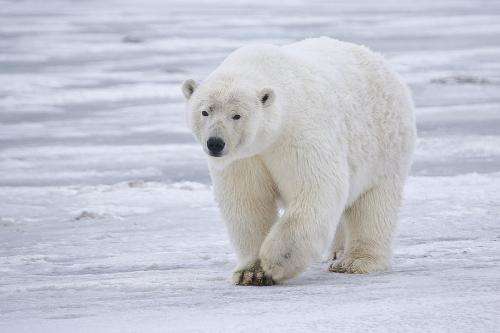January 21, 2015 report
Study shows cold climate animals may suffer as global temperatures rise

(Phys.org)—A study conducted by a quartet of researchers from the University of Sydney, Université de Lausanne and the University of Glasgow has led to findings that suggest cold climate animals are more likely to suffer adverse impacts due to global warming than are animals that naturally live in warmer parts of the world. In their paper published in the journal Royal Society Open Science, the team describes how exposing mosquitofish to various temperature changes showed its ability to acclimate to changes in its environment and why the team believes such findings likely apply to other species as well.
As it appears we humans are not likely to alter the course of global warming, at least any time soon, scientists continue to study other animals to try to ascertain how they might fare in an increasingly uncertain climatic future. In this new effort, the researchers chose to focus on mosquitofish because they have a reputation of being able to acclimate to changes in their environment. The fish were introduced into Australia in 1925, in hopes that they would help reduce the mosquito population. Since then they have come to inhabit waters all across the country, due to their uncanny ability to acclimate to water temperature differences and are now considered a pest.
To learn more about the acclimation abilities of the fish, the team captured specimens from a well studied site with known temperature variations, and placed them in tanks of water of varying degrees, from 20 to 30 degrees centigrade and tested their ability to acclimate by creating an artificial stream, also of varying degrees and noting how well they swam against it. Analysis of the data revealed that some specimens were much better at acclimating to warmer temperatures than others, offering a clue as to how the fish species was able to spread so successfully. But the data also showed that despite their hardy reputation, the fish that were able to acclimate to colder water were not able to do so for warmer water, which suggests that such fish will likely fare poorly as average temperatures in their environment increase over the next century—because of the difficulty in acclimating to more extreme fluctuations in temperature.
The team says their findings likely apply to other species as well, and theorize that as the world grows warmer, animals that live in colder climates are likely to experience more difficulty acclimating than will those that live in warmer places, particularly cold blooded species.
More information: Generalist-specialist trade-off during thermal acclimation, Royal Society Open Science, rsos.royalsocietypublishing.or … /10.1098/rsos.140251
Journal information: Royal Society Open Science
© 2015 Phys.org




















